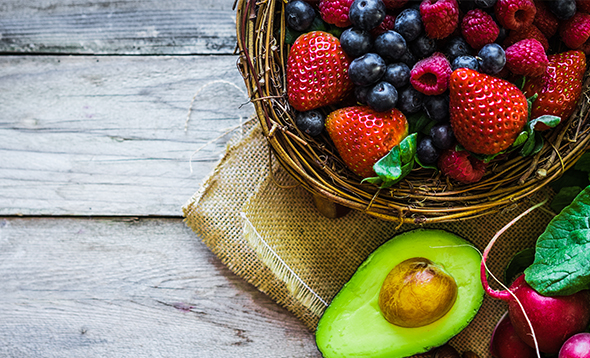That organic living is a conscious health choice
Foods to Nourish Your Skin Type
Cleanser, exfoliating scrub, toner, sunblock, day cream, night cream, pore-minimising mask, wrinkle repair serum. Just how much does the arsenal of skincare lining your bathroom shelves cost? How many minutes of your day do you spend on your well-choreographed skincare routine?
What if you could streamline your skincare regime or enhance your current efforts? Well, you can – and it doesn’t require a visit to yet another cosmetic counter, spa, or pharmacy.
Whether your complexion is dry, sensitive, oily, or mature, certain foods such as those listed below can aid these common concerns. What you eat can affect your hormonal balance, skin elasticity and the overall health of your skin. So, shift your focus from topical to edible, and nourish your skin inside out.
For oily, acne-prone skin
Is your complexion blemish-prone and no amount of blotting can rid that dreaded T-zone sheen? It’s time to give these foods a try:
- Plant-based milks (or ‘mylks’)
Consider swapping cow’s milk for vegan milks such as soy, coconut, almond or cashew. The reproductive hormones - known as androgens - in cow’s or other mammals’ milk can stimulate the sebaceous glands near the surface of the skin to produce more oil. Switching to a nut, bean or seed-based alternative allows your body to manage your hormones - without interference from the additional hormones from your diet.
- Whole grains
Refined grains such as white rice and white flour-based products including breads, noodles and biscuits, are digested and absorbed more quickly. This results in fluctuations in blood sugar levels that can lead to hormonal shifts and inflammation – two key causes of acne. With more fibre and protein, whole grains provide glycemic control. They improve digestive regularity and help to promptly remove waste products, which may irritate the skin, from the system.
- Greens
Emerald-hued vegetables of all kinds are fantastic dietary cleansers thanks to their rich chlorophyll content, which flushes out toxins before they can be absorbed. The sulphur in these greens also improves the liver’s ability to process toxins.
For Dry Skin
Looking for a moisturiser for your dry, flaky skin? Add these foods to your grocery list:
- Coconut
This fruit – in all forms - is perfect for parched skin. Fresh young coconut water is considered an isotonic solution as its electrolyte profile matches that of our blood, so it seamlessly rehydrates our system. The natural essential oils in coconut milks, creams and flesh lubricate our skin while offering protective medium-chain triglycerides – such as capryllic acid and lauric acid - that guard against microbes that invade chapped or cracked surfaces.
- Avocado
This skin-rejuvenating fruit packs in lipid-based antioxidants, vitamins, healthy monounsaturated fats, and the pale mint-coloured pigment lutein, which improves the water-retaining capacity of skin cells and enhances the skin’s overall elasticity.
For sensitive skin
Troubled by rashes, redness, itchiness and inflammation? Soothe your skin with these:
- Coldwater fish
This type of fish is rich in the omega-3 fatty acids, EPA and DHA, which can effectively prevent new flare-ups and reduce existing inflammations. While not as concentrated or efficiently processed, seeds such as flax and chia, and nuts such as almonds and walnuts, contain omega-3s as well.
- Probiotics
The outermost layers of the skin serve as an essential protection to shield the body from harmful compounds and pathogenic microbes. Research suggests a close link between gut health and immunity. Imbalances in gastrointestinal bacteria can affect secretions in the glands of the skin and make the skin susceptible to superficial irritants. Consuming foods containing beneficial probiotics including yogurts, kimchi, miso, and kefir, may prevent inflammatory or infectious reactions and maintain skin health.
For mature skin
- Seeds
Collagen is the protein-rich substance that prevents saggy or wrinkled skin.
To ensure the body produces and maintains high levels of collagen, it’s crucial to include zinc and copper in your diet. A good source of these minerals, seeds can easily be added to porridges, salads or trail mixes for a skin boost.
- Tropical fruits
While citrus like oranges, limes and lemons are often regarded as the best in class for vitamin C, papaya and pineapple are actually superior sources. A potent source of antioxidants, that also supports collagen integrity, it guards against free radicals while repairing environmental and age-related damage to skin cells.
- Bone broths and soups
A media darling of late, bone broths are made by simmering the bones of fish, chicken and beef for eight or more hours. This releases the gelatins and trace minerals in the bones, making it easier for the body to digest and absorb. While popular claims of the bone broth as an anti-aging skincare wonder are debated within the scientific community, the same amino acids - proline, glycine, glutamine, and arginine - from the cartilage surrounding the bones are indeed what the collagen in our skin is made of. Go on and drink your way to healthy, radiant skin!


























_1672804154.jpg)

_1611290459.jpg)